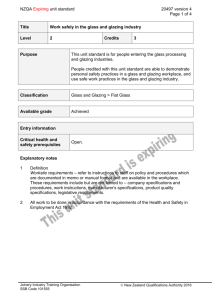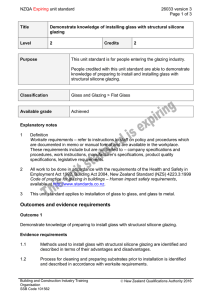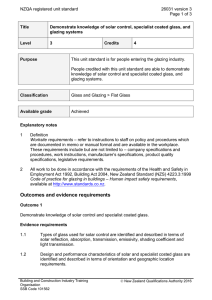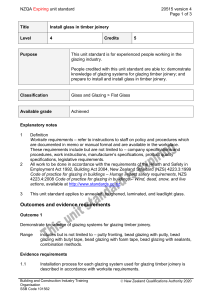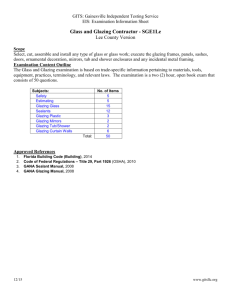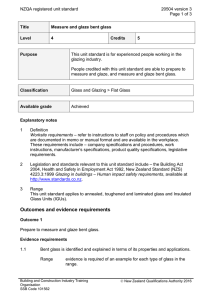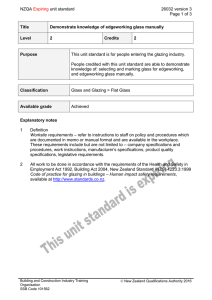NZQA unit standard 20517 version 4
advertisement
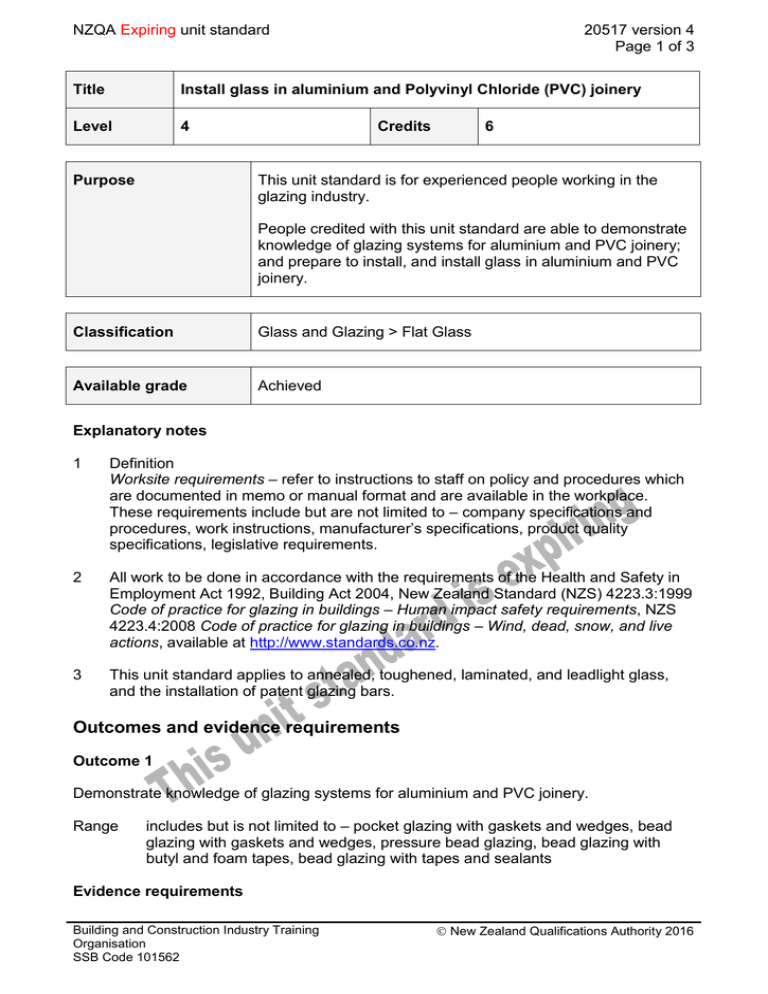
NZQA Expiring unit standard 20517 version 4 Page 1 of 3 Title Install glass in aluminium and Polyvinyl Chloride (PVC) joinery Level 4 Purpose Credits 6 This unit standard is for experienced people working in the glazing industry. People credited with this unit standard are able to demonstrate knowledge of glazing systems for aluminium and PVC joinery; and prepare to install, and install glass in aluminium and PVC joinery. Classification Glass and Glazing > Flat Glass Available grade Achieved Explanatory notes 1 Definition Worksite requirements – refer to instructions to staff on policy and procedures which are documented in memo or manual format and are available in the workplace. These requirements include but are not limited to – company specifications and procedures, work instructions, manufacturer’s specifications, product quality specifications, legislative requirements. 2 All work to be done in accordance with the requirements of the Health and Safety in Employment Act 1992, Building Act 2004, New Zealand Standard (NZS) 4223.3:1999 Code of practice for glazing in buildings – Human impact safety requirements, NZS 4223.4:2008 Code of practice for glazing in buildings – Wind, dead, snow, and live actions, available at http://www.standards.co.nz. 3 This unit standard applies to annealed, toughened, laminated, and leadlight glass, and the installation of patent glazing bars. Outcomes and evidence requirements Outcome 1 Demonstrate knowledge of glazing systems for aluminium and PVC joinery. Range includes but is not limited to – pocket glazing with gaskets and wedges, bead glazing with gaskets and wedges, pressure bead glazing, bead glazing with butyl and foam tapes, bead glazing with tapes and sealants Evidence requirements Building and Construction Industry Training Organisation SSB Code 101562 New Zealand Qualifications Authority 2016 NZQA Expiring unit standard 20517 version 4 Page 2 of 3 1.1 Installation process for each glazing system used for glazing aluminium and PVC joinery is described in accordance with worksite requirements. 1.2 Sealant and glazing materials used for glazing aluminium and PVC joinery are identified in accordance with worksite requirements. Range evidence is required for each of the glazing systems in the element range. Outcome 2 Prepare to install glass in aluminium and PVC joinery. Evidence requirements 2.1 Selection of glazing materials and sealants reflects their suitability for the installation method and the specifications for the work. 2.2 All necessary equipment, tools, and installation materials are checked and assembled before work begins in accordance with worksite requirements. 2.3 Aluminium and PVC joinery frames to be glazed are checked in accordance with worksite requirements. Range includes but is not limited to – obstruction free, clean, dry, primed and/or sealed, compatibility with glazing material and glazing systems. Outcome 3 Install glass in aluminium and PVC joinery. Evidence requirements 3.1 Installation of glass meets job specifications and worksite requirements. Range requirements may include but are not limited to – correct blocking, glass is plumb and square and correctly orientated, tapes are sealed at corners, gaskets and wedges are not stretched, tooled joints are finished correctly, labels are applied where required. 3.2 Where required, reassembly of disassembled frames is completed in accordance with worksite requirements. 3.3 Operations are completed without injury to personnel or damage to product and equipment in accordance with job specifications and worksite requirements. 3.4 Installation is cleaned and work area is left clear and cleaned in accordance with worksite requirements. 3.5 Customer is advised of any relevant maintenance requirements in accordance with worksite requirements. Building and Construction Industry Training Organisation SSB Code 101562 New Zealand Qualifications Authority 2016 NZQA Expiring unit standard Replacement information 20517 version 4 Page 3 of 3 This unit standard, unit standard 20515, and unit standard 20516 were replaced by unit standard 28757. This unit standard is expiring. Assessment against the standard must take place by the last date for assessment set out below. Status information and last date for assessment for superseded versions Process Version Date Last Date for Assessment Registration 1 27 April 2004 31 December 2017 Review 2 21 May 2010 31 December 2017 Review 3 18 June 2015 31 December 2017 Rollover 4 15 October 2015 31 December 2020 Consent and Moderation Requirements (CMR) reference 0073 This CMR can be accessed at http://www.nzqa.govt.nz/framework/search/index.do. Please note Providers must be granted consent to assess against standards (accredited) by NZQA, before they can report credits from assessment against unit standards or deliver courses of study leading to that assessment. Industry Training Organisations must be granted consent to assess against standards by NZQA before they can register credits from assessment against unit standards. Providers and Industry Training Organisations, which have been granted consent and which are assessing against unit standards must engage with the moderation system that applies to those standards. Requirements for consent to assess and an outline of the moderation system that applies to this standard are outlined in the Consent and Moderation Requirements (CMR). The CMR also includes useful information about special requirements for organisations wishing to develop education and training programmes, such as minimum qualifications for tutors and assessors, and special resource requirements. Building and Construction Industry Training Organisation SSB Code 101562 New Zealand Qualifications Authority 2016
